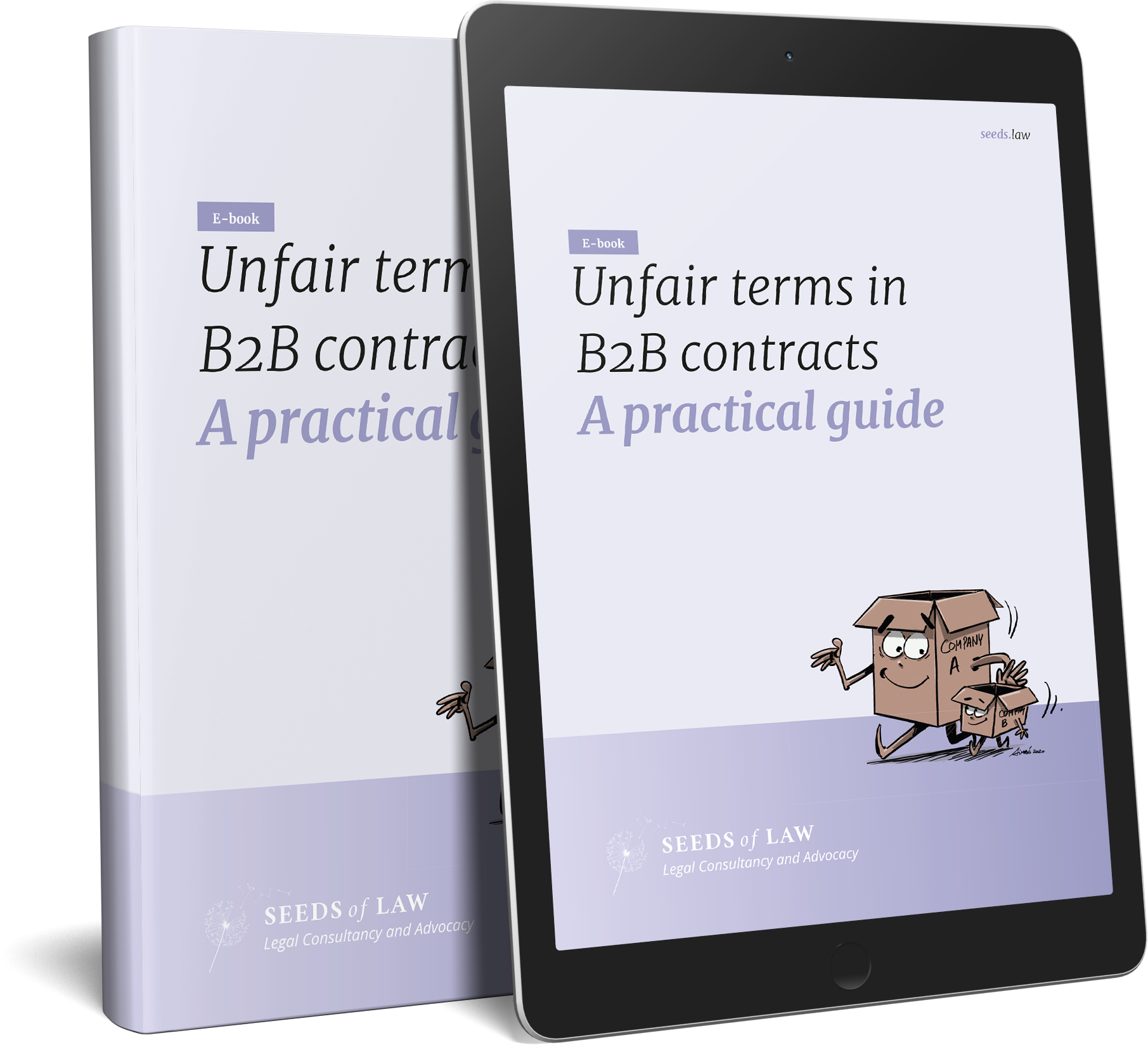- Commercial and Economic Law
- Aurélie Glinne - Steve Griess
- B2B , B2B contracts , service contract , distribution contract , sales concession agreement , agency , franchise contract , franchising , consultancy , provision of various services
As the B2B law applies to all contracts between businesses, it will generally concern contracts for the provision of services and commercial distribution that are common in business life. These contracts sometimes reflect a certain imbalance between the parties and will therefore be a potentially important target for the application of the principles of the B2B law.
As we explained in the introduction to our practical guide, subject to a few exceptions, the new B2B law applies to all contracts between businesses, and to all the clauses of these contracts.
However, there is a certain amount of legal uncertainty with respect to the practical application of this B2B regulation, which has important consequences for commercial partnership agreements such as distribution contracts and services contracts.
Numerous pitfalls arising from the B2B law may be hidden or appear in your distribution and services contracts. Be aware of them!
1. Is your contract affected?
Commercial contracts mainly concern sales concession agreements, commercial agency and franchise contracts, as well as, in general, all contracts for the provision of various services and consultancy contracts.
It is certain that all of these contracts must comply with the B2B legislation and be drafted in such a way as to avoid unfair terms which could be sanctioned by the courts.
This is all the more important as certain contractual relationships, such as commercial distribution, are naturally characterised by a certain economic and sometimes legal "imbalance" between the parties and are therefore particularly concerned by the new protective provisions.
In practice, many of these contracts are likely to be affected by a clause which may be considered unfair, as it creates manifest inequalities which could be considered unjustified. The "normal" imbalance between the parties might then be considered disproportionate and have legal consequences.
Particular attention should therefore be paid and the key words are prudence and anticipation.

2. Which clauses should be paid attention to?
Upon receiving or drafting a contract, or when renewing or amending an existing contract, you must ensure that the contractual provisions do comply with requirements of the new B2B law.
Your attention must first of all focus on the possible presence of a "black listed" clause (prohibited in all circumstances), and then extend to the analysis of "grey listed" clauses (presumed unfair).
Based on our experience, we have compiled a set of fairly standard clauses in contracts for the provision of services or distribution of goods, which will now have to be carefully reviewed, to avoid that they would be annulled.
Examples of "black listed" clauses:
- The clause which provides that your business partner has the right to suspend the payment of your invoices, but in return prohibits you from suspending the performance of your services;
- The clause according to which, as a businessman or partneremployee, you waive all legal recourse against your supplier or business partner;
- The clause in a sales concession agreement which provides that the principal may decide, in an arbitrary manner without objective reason, to refuse one of your orders when you are bound by fixed obligations on your part;
- The clause in a services contract which authorises the other party to suspend the execution of the contract, unilaterally and of its own free will, at any time and without compensation;
- The clause in a services contract which gives you the right, as a services provider (an energy supplier for example) to request from your client a guarantee in the event of abnormal high consumption, without the "abnormal" nature of this consumption having been specified in the contract;
- Clauses which provide that you have acknowledged and/or have adhered to general conditions or other contractual documents containing additional obligations, without your co-contractor having given you the concrete opportunity to take notice of such documents.
Examples of "grey listed " clauses :
- The clause by which your partner places all the commercial and/or economic risks linked to his activity on your shoulders;
- The clause whereby, as a supplier, you would be obliged to take back unsold products from your distributor without compensation;
- The clause which requires you, as a supplier, to assume the risk of theft of goods after their delivery to your distributor;
- The clause which provides for the possibility for the supplier or producer to unilaterally modify the sales price, without a validly identified reason;
- The clause in a distribution contract which provides for a significant investment by the distributor, when this investment is clearly not justified by the needs of the contract;
- The clause which grants your business partner the right to unilaterally modify the price of the goods, the quantity and characteristics of the products, the price of its ongoing services, the place of performance of the services provider's mission, etc. ;
- The clause which determines the sales price of the goods according to future sales of the distributor ;
- The clause which authorises you to modify or reduce the workload of your consultant, according to your company's results, without consulting him;
- The clause which provides that only documents emanating from one of the parties can be used as evidence against the latter in the event of a dispute;
- The absence of a reasonable period of notice in the event of termination;
3. What can you do in practice and what advice can we give you?
We advise you to act proactively, as soon as you can, as a matter of priority.
To do so, you will need to review your (standard) contract(s) and adapt them to the new regulations.
As we have already indicated, the assessment of the unfairness of many provisions is very broad and linked to many factors (such as current usage or the circumstances of the contract) and it is therefore advisable to be as complete and precise as possible when drafting the terms of your contracts to explain the context justifying the terms chosen.
We are happy to already give you some ideas:
- Make a detailed history, if possible in the "preamble of the contract", of the steps taken between the parties in the context of the negotiations and the circumstances of the collaboration envisaged;
- Draw up a precise and detailed list of the reasons for unilateral changes to certain conditions (such as the actual needs of your network, etc.) ;
- Clearly indicate the information/documents provided before the contract was concluded, in order to be able to prove that your partner was fully aware of the extent of his commitment;
- If the contract contains clauses that tend to be particularly favorable for you and your rights, without equal consideration for your partner, you must clearly justify their (particular) interest and the (legitimate) reasons in the body of the contract itself, and if possible in each clause.
As part of this very important preventive work, the experience of our firm's practitioners will enable us to check your contracts, eventually proposing improvements to bring your clauses into line with these new regulations.
This will not only prevent your contractual relationship from significantly harming your company's interests, but also prevent you from being confronted with questions about the validity of your contracts.
We are therefore at your entire disposal to assist and advise you in the revision of your contracts for the provision of services and/or the distribution of goods, if you believe that they contain such clauses, or if you simply want to be sure that they do not. Contact our specialists via info@seeds.law.
False Read alsoDiscover our e-book about unfair terms in B2B contracts
In our e-book “Unfair terms in B2B contracts” you will discover a number of interesting tips to familiarize yourself with the new principles of the B2B law.




